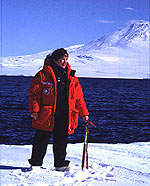![[Currents header graphic]](http://www.ucsc.edu/homeart/currents_header.gif)
![[Currents header graphic]](http://www.ucsc.edu/homeart/currents_header.gif)
September 21, 1998

|
|
Lynda Goff, on a research trip in Antarctica
|
By Tim Stephens
In the field of phycology (the study of algae), Lynda Goff's laboratory is a happening place. Goff, a UCSC professor of biology, received two major awards at the 1998 meeting of the Phycological Society of America, held in Flagstaff, Arizona, in August. The awards are the latest in a series of honors recognizing her leading role in the field.
The most significant of the awards, according to Goff, is the society's Luigi Provasoli Award, which honors the best paper published during a two-year period in the Journal of Phycology. Goff's lab has now won the Provasoli Award, named after a famous microbiologist, three of the six times it has been given.
The paper that won this year's award was published in 1996 and addresses the evolution of parasitism in red algae. The authors, in addition to Goff, were Debra Moon, Pi Nyvall, Birgit Stache, Katrina Mangin, and Giuseppe Zuccarello, all of whom worked in her lab at UCSC.
"This award really recognizes the work of everyone in the lab," Goff said.
Goff was also honored with the International Medal in Phycology, bestowed on her by a consortium of international research organizations in recognition of her impact in both research and teaching.
For almost two decades, Goff has been studying parasitism in red algae, the largest group of marine plants (commonly known as seaweed). She has made a series of astonishing discoveries about the lifestyles and evolutionary histories of red algae that parasitize other species of red algae.
For example, she found that parasitic red algae inject their genetic material into the cells of their hosts and thereby commandeer the host's cellular machinery. This mode of infection is similar to that of viruses and was previously unheard of in higher organisms such as plants.
Goff and her coworkers subsequently demonstrated that many of the parasitic red algae evolved directly from the hosts they now afflict, making them, in a sense, traitors to their own species.
"I study bizarre biology," Goff said.
Bizarre it may be, but her findings provide valuable insights into some of the most important issues in biology, such as gene regulation, evolution, and host-parasite interactions.
In addition to her research, Goff has taught graduate courses and led workshops on every continent in the world, including Antarctica.
"My aim is to teach graduate students throughout the world how to use the powerful techniques of molecular biology in their research," Goff said.
The list of countries in which she has taught includes Australia, Brazil, China, Egypt, Germany, Italy, Japan, Korea, Norway, Sweden, and Venezuela. In Antarctica, Goff helps coordinate and teach an advanced biology training course sponsored by the National Science Foundation. She has also taught at institutions throughout the United States. Many of the graduate students and postdoctoral researchers in Goff's lab came there from other countries after taking one of her courses.
While pursuing these international teaching projects, Goff has maintained an active research lab and taught undergraduate and graduate courses at UCSC. In July she was named UCSC's associate vice chancellor for undergraduate education.
"I've been pretty busy," she acknowledged.